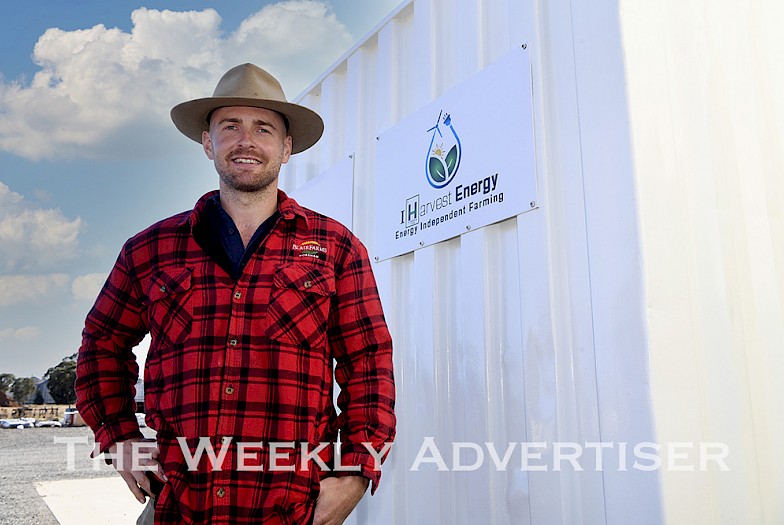The project scope, which involves a collaboration between industry and all tiers of government, embraces emerging renewable-energy capture and storage technology to produce ‘green’ hydrogen via on-farm electrolysis.
The goal is to replace farm and agricultural-industry reliance on diesel and in the long term establish a network of hydrogen-fuel outlets for heavy vehicles and machinery and a broad renewable-farm-energy blueprint for export.
The concept, embracing both electricity and hydrogen renewable-energy evolution, has undergone extensive planning and scrutiny.
It has the potential to dramatically reduce an agricultural carbon footprint across the region, increase cost and productivity efficiencies, set the Wimmera as a foundation for technological change and generate economic activity and jobs. It also fits neatly into a Federal Government hydrogen-based renewable-energy push.
Energy Independent Farming is the brainchild of Thomas Blair, a returned serviceman and son of Wimmera agricultural entrepreneur Peter Blair, and his business partner and international renewable-energy specialist Bradley Warren from Queensland.
The project is in its infancy and expectations are high. The partners have spent the past 16 months doing groundwork, refining plans and establishing relationships with energy-industry stakeholders.
A $250,000 State Government grant has opened the door for a start on the stage-one energy-farm prototype.
The funding breakthrough and confidence of a rapid and broad concept acceptance and adoption has prompted the team to immediately apply for Federal Government support to push into an expansive $15-million project stage.
Mr Blair said observing an uptake of renewable-energy innovation in Europe after finishing his time in the military sparked his interest in bringing the idea home to the Wimmera.
“Having a family-farming background I could see where we might be able to implement change – to get away from reliance on diesel while at the same time having a guaranteed supply of industrial-level energy regardless of a regional, rural or remote circumstance,” he said.
“The main energy consumption for Blairfarms is the many different types of farm machinery that use on average 130,000 litres of diesel a year.
“PBseeds operates a grain-cleaning facility that runs 12 to 16 hours a day.
“The plant machinery operates on three-phase electricity and due to our rural location, this requires a 160-kilowatt diesel generator.”
The annual cost for this generator is greater than $50,000.
“Financial benefits of pursuing an alternative, apart from developing a carbon-neutral industry, are obvious,” Mr Blair said.
Mr Warren has extensive experience with renewable-energy opportunities, including a 13-year stint in the Middle East where he worked on finding commercially viable solutions for major environmental projects.
“We looked at hydrogen in 2008 to 2010 and the rolling out of investment into electric vehicles. Part of that program was to look at industrial areas of United Arab Emirates and how those areas could use renewables for future-proofing,” Mr Warren said.
“At that stage cost was a major issue for renewables and it wasn’t viable to pursue ‘green’ hydrogen. But that opportunity has come of age in the past 18 months.”
The first stage of the project, involving the installation of a 100-kilowatt solar photovoltaic, PV, system at the site, which will initially offset power needs of PBSeeds, is already underway.
Following stages will involve adapting the site for the installation of a hydrogen electrolyser and battery.
The level of Commonwealth funding will determine the speed of further development stages, which include collaborating with stablemate business Traction Ag to explore hydrogen-powered machinery applications, expanding an agribusiness hybrid-energy network and establishing ‘localised power micro-grids’.
Energy Independent Farming already has an alliance with energy storage company Local Energy Centres, which focuses on developing agricultural micro-grids and has earmarked Blairfarms as a showcase for hybrid hydrogen-powered farming.
The group has also been working behind the scenes with Wimmera Development Association, which has been strongly advocating the potential of hydrogen.
Association chief executive Chris Sounness said the project was an exciting development.
“It is basically a demonstration of what will become the norm across our region in the coming years,” he said.
“While it seems to be something out of our reach at the moment, broad adoption of this type of technology and process will be far more rapid than most people realise.
“It is great to see such a prototype in our region.”
RELATED: Protein plant Quantong waste water plan under microscope
The entire April 28, 2021 edition of The Weekly Advertiser and AgLife is available online. READ IT HERE!






